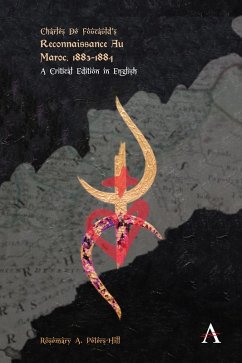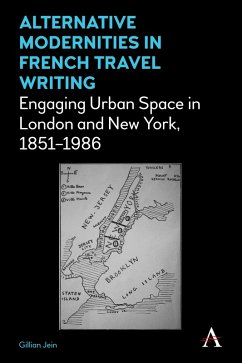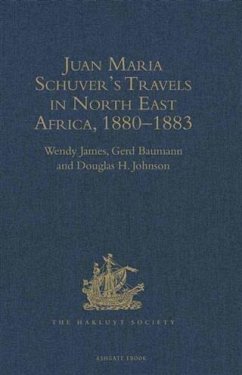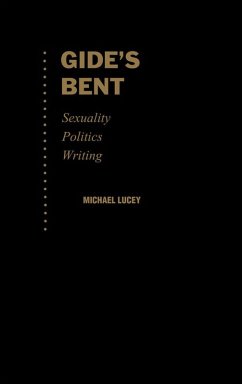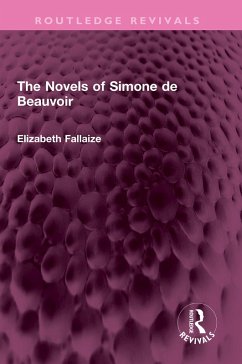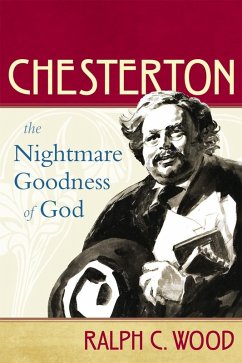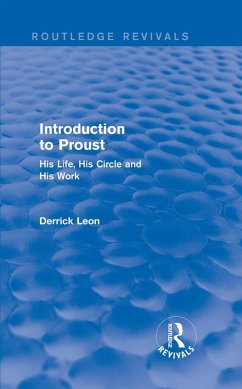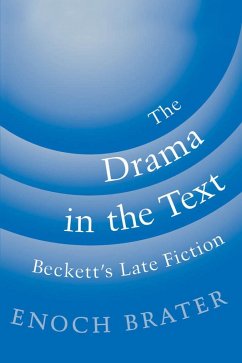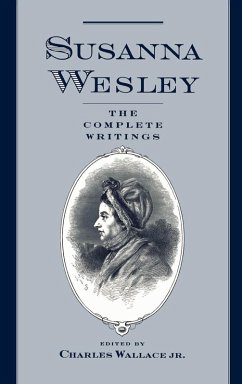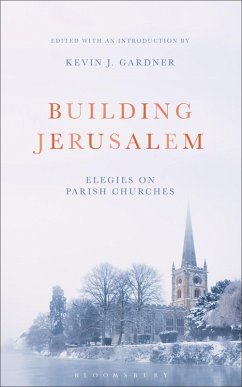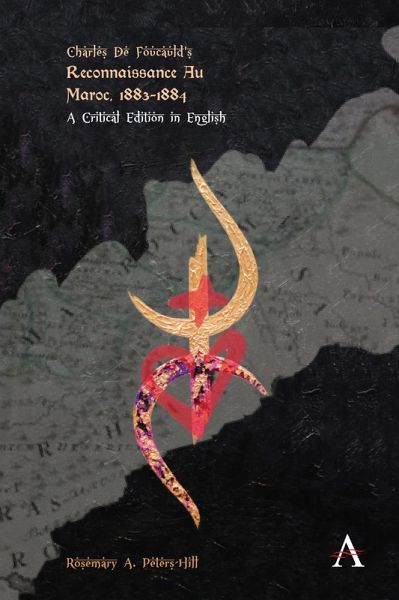
Charles de Foucauld's Reconnaissance au Maroc, 1883-1884 (eBook, PDF)
A Critical Edition in English
Versandkostenfrei!
Sofort per Download lieferbar
55,95 €
inkl. MwSt.
Weitere Ausgaben:

PAYBACK Punkte
28 °P sammeln!
Womanizer - Delinquent - Glutton - Deserter; Visionary - Linguist - Explorer - Hermit. The lexical fields do not match, yet both sets of descriptors apply to one man: Blessed Charles de Foucauld (1858-1916), one of nineteenth-century France's most complex and challenging figures. Upon graduation from the prestigious École de Saumur, Foucauld went to North Africa with his cavalry regiment. In a sense, he never went home: the desert had called to him, converted him even, and the once-renegade scion devoted the rest of his life to studying the land and culture of North Africa and preserving its ...
Womanizer - Delinquent - Glutton - Deserter; Visionary - Linguist - Explorer - Hermit. The lexical fields do not match, yet both sets of descriptors apply to one man: Blessed Charles de Foucauld (1858-1916), one of nineteenth-century France's most complex and challenging figures. Upon graduation from the prestigious École de Saumur, Foucauld went to North Africa with his cavalry regiment. In a sense, he never went home: the desert had called to him, converted him even, and the once-renegade scion devoted the rest of his life to studying the land and culture of North Africa and preserving its language and traditions. The two halves of his life part almost mathematically: a dissolute, disconsolate orphan whose wealthy family, peers, and superiors did not know what to do with him; and then an intuitive, dedicated scholar and priest who revolutionized European knowledge of Morocco's geography and culture, and defied the mission civilisatrice by refusing to evangelize the Berber population among whom he lived. Foucauld's biography typically divides into these two sections, with his youth glossed almost as a fleeting adventure and clear priority assigned to his later years as a hermit and spiritual director.
This book seeks to turn that model on its head. Rosemary Peters-Hill provides an in-depth examination of the year Foucauld spent exploring Morocco in 1883-1884, after he had resigned his army commission and taught himself Arabic and Hebrew. This book is more than merely a translation: it is a meticulously researched and documented critical edition that addresses the history of nineteenth-century French colonial endeavors and Moroccan resistance to them; cultural traditions and spaces within the closed country where Foucauld sojourned; the intersections of language, politics, and economics with religion; the praxis of Arabic and Berber interactions and the ways in which official cartographies neglect local knowledge of tribal and seasonal rituals; and the failures of Empire when it comes to defining or delimiting national identity. Peters-Hill, as a literary scholar, also brings to bear a careful examination of Foucauld as author: the ways he pitched his account toward government bodies likely to pay attention to them, his use of literary tropes within his memoir, his narrative agency. And the way these things change: through Foucauld's encounter, and increasing identification, with Morocco as not just a backdrop for imperial expansion but a subject and a plurality of voices in its own right. As Foucauld's narrative advances, so too do its Arabic inflections, its lyricism about landscape and cultural practices, its investment in documenting and preserving Morocco's own specific history. Another, much later, Foucault (Michel) would write that space itself has a history: he might well have been inspired by Charles de Foucauld's conversion and dedication to the specific selves and possibilities discovered during his immersion in Moroccan space.
Peters-Hill has written a study of Charles de Foucauld's youthful undertaking in unknown territory that seeks to represent as honestly as possible both the evolution of Foucauld's mindset regarding French engagement in Morocco and the consequences of his work in that country. While delving into how the author is changed by Morocco, she nonetheless holds Foucauld accountable for his nationalist and religious biases, the details he discounts or ignores, the unavoidable oversights in such a brief cultural encounter, the things he got wrong. She situates Foucauld's year in Morocco as the exegesis of his ultimate desert calling, the transformation of a black sheep into a sacrificial lamb, a man the Catholic Church venerates as a martyr. This critical edition draws from several discrete fields, which nonetheless intersect in Foucauld - travel writing, botany, hydrology, and topography; cartography, ethnography and sociology; linguistics and amazighité, alongside formal literary criticism and French (post-) colonial studies - to present a fuller view of a writer whose legacy remains an inspiration, a frustration, and an enigma.
This book seeks to turn that model on its head. Rosemary Peters-Hill provides an in-depth examination of the year Foucauld spent exploring Morocco in 1883-1884, after he had resigned his army commission and taught himself Arabic and Hebrew. This book is more than merely a translation: it is a meticulously researched and documented critical edition that addresses the history of nineteenth-century French colonial endeavors and Moroccan resistance to them; cultural traditions and spaces within the closed country where Foucauld sojourned; the intersections of language, politics, and economics with religion; the praxis of Arabic and Berber interactions and the ways in which official cartographies neglect local knowledge of tribal and seasonal rituals; and the failures of Empire when it comes to defining or delimiting national identity. Peters-Hill, as a literary scholar, also brings to bear a careful examination of Foucauld as author: the ways he pitched his account toward government bodies likely to pay attention to them, his use of literary tropes within his memoir, his narrative agency. And the way these things change: through Foucauld's encounter, and increasing identification, with Morocco as not just a backdrop for imperial expansion but a subject and a plurality of voices in its own right. As Foucauld's narrative advances, so too do its Arabic inflections, its lyricism about landscape and cultural practices, its investment in documenting and preserving Morocco's own specific history. Another, much later, Foucault (Michel) would write that space itself has a history: he might well have been inspired by Charles de Foucauld's conversion and dedication to the specific selves and possibilities discovered during his immersion in Moroccan space.
Peters-Hill has written a study of Charles de Foucauld's youthful undertaking in unknown territory that seeks to represent as honestly as possible both the evolution of Foucauld's mindset regarding French engagement in Morocco and the consequences of his work in that country. While delving into how the author is changed by Morocco, she nonetheless holds Foucauld accountable for his nationalist and religious biases, the details he discounts or ignores, the unavoidable oversights in such a brief cultural encounter, the things he got wrong. She situates Foucauld's year in Morocco as the exegesis of his ultimate desert calling, the transformation of a black sheep into a sacrificial lamb, a man the Catholic Church venerates as a martyr. This critical edition draws from several discrete fields, which nonetheless intersect in Foucauld - travel writing, botany, hydrology, and topography; cartography, ethnography and sociology; linguistics and amazighité, alongside formal literary criticism and French (post-) colonial studies - to present a fuller view of a writer whose legacy remains an inspiration, a frustration, and an enigma.
Dieser Download kann aus rechtlichen Gründen nur mit Rechnungsadresse in A, D ausgeliefert werden.




